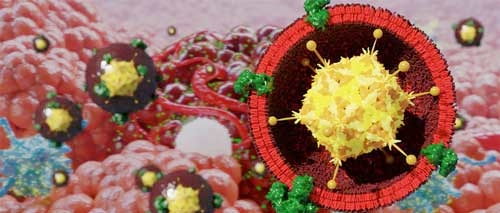|
NOVIDADES
Researchers at the University of Helsinki have discovered a novel system to generate an artificially enveloped oncolytic adenovirus to direct the immune response against cancer (Nature Communications, "Artificially cloaked viral nanovaccine for cancer immunotherapy"). Virus-based cancer vaccines are nowadays considered an interesting approach in the field of cancer immunotherapy. Targeting tumour-associated antigens is proven to be effective. However, the identification of these antigens remains challenging.  The new artificially cloaked viral-based nanovaccines for cancer immunotherapeutic applications. Image: University of Helsinki
“ExtraCRAd is a versatile and advanced technology for cancer treatment, a result of the synergetic effect between the oncolytic virus and the cancer-cell membranes,” says Professor Santos. Professor Cerullo continues, “Overall, ExtraCRAd might serve as the next generation of personalised cancer vaccines with enhanced features over standard oncolytic virus therapy, representing an alternative way to immunologically target cancer.” Researchers from the University of Helsinki have demonstrated that ExtraCRAd displays an increased infectivity and oncolytic effect in vitro, and in a human-relevant animal model of tumour in vivo. They also show that this new nanovaccine platform controls the growth of aggressive melanoma and lung tumours both in preventive and therapeutic vaccination strategy, creating a highly specific anti-cancer immune response. “Building artificial envelopes made of cancer-cell membrane is a new and creative approach that our lab has developed together with Santos’ Lab. This would have not been possible using the expertise of only one laboratory,” adds Professor Cerullo. “This project again emphasises the importance of multidisciplinary collaboration, mutual trust and ultimately the importance of the work environment. We both have expanded our personal knowledge by stepping outside of our comfort zones,” note researchers Fusciello and Fontana, who were also awarded Joint Projects of the Young Researchers funding by the Drug Research Program for this project. “We highly recommend that young scientists be curious and have more discussions with those around them. The next great idea is just around the corner.” University of Helsinki. Accessed: Jan 10, 2019.
|
|||||||||||||||||||||||||